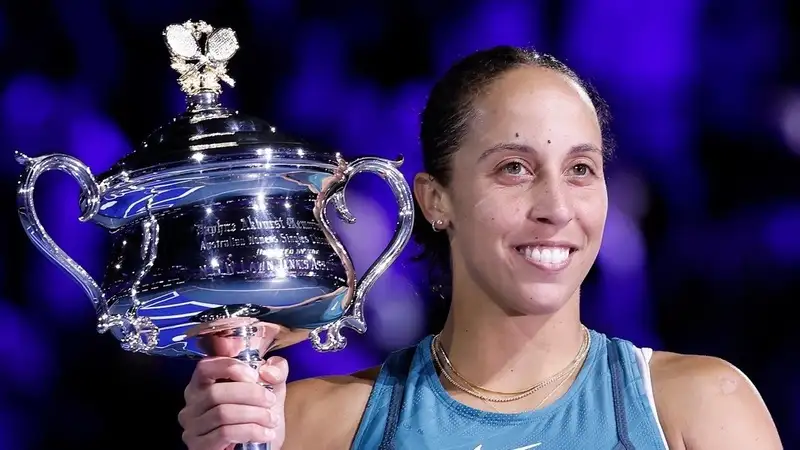INDIAN WELLS, Calif. — From the age of 10, Madison Keys’ life was centered around winning a Grand Slam. Her family moved to Florida to support her training at Chris Evert’s academy, and the expectations were set high.
Keys quickly rose in the tennis world, debuting in a major main draw at 16 at the US Open and winning her first match.
However, it took 46 major appearances, with various results and a US Open final in 2017, for Keys to achieve her long-held dream. This January, she won the Australian Open, defeating world No. 1 Aryna Sabalenka in the final.
Returning home with the trophy, Keys, along with her husband and coach Bjorn Fratangelo, was confronted with an unexpected question: “Now what?”
She spent the following days feeling emotionally exhausted.
“It was really emotionally draining,” Keys, 30, told ESPN this week before the BNP Paribas Open. “You experience the highest of highs, and then it suddenly ends when you get home. Recovering was like emerging from a coma. Despite the happiness and amazing achievement, the emotional aftermath was surprising.”
Keys, now ranked No. 5, isn’t alone in this post-Slam experience. She had been forewarned about this feeling.
“Many former players reached out, saying, ‘The existential crisis is normal,'” Keys mentioned.
Players advised her that her first practice back would be difficult, which it was. More importantly, they suggested she would need to redefine her goals. Having achieved her main ambition, she needed new motivations to stay driven.
Dominic Thiem, who won the 2020 US Open, described the impact of achieving his major title.
“After the US Open, I was euphoric,” Thiem said in a 2021 interview. “My results were still good, but during this season’s preparation, I fell into a hole… I had spent 15 years chasing this goal single-mindedly, and once achieved, it was a void.”
Ashleigh Barty, a three-time major champion, shared similar sentiments while promoting her book, ‘My Dream Time.’
“Winning Wimbledon was my career-long dream,” Barty stated. “But after achieving it in June 2021, my inner drive diminished.”
In her book, she wrote: “I don’t know what I’m playing for anymore. I think I’m done. I have nothing left, no spark.”
Barty retired shortly after, despite winning the 2022 Australian Open and being world No. 1 at age 25.
Determined to avoid a similar path, Keys proactively sought help. She began working with a psychologist a year prior and continued sessions weekly post-Australian Open. She discussed her unexpected emotions, comparing the experience to an intense version of post-wedding blues. “It’s like immense planning and buildup, then you wake up and it’s over,” she explained.
This dialogue has been beneficial, helping her gain perspective during what she anticipated would be the happiest period of her life.
Instead of immediately returning to competition, Keys took time off. While peers competed in Middle East events, she trained at the USTA National Campus in Orlando. Being around younger American players allowed her to appreciate her victory, which is rare in tennis’s weekly tournament schedule. It also gave her a confidence boost.
“Younger players who previously wore visors were now wearing hats because of me,” Keys said, amused. “Gen Z likes me!”
Being well-regarded by fellow players is important to Keys. Unlike some who avoid friendships for competitiveness, she values being friendly and supportive in the locker room.
The reaction to her Australian Open win highlighted this respect. Many, including Coco Gauff, Jessica Pegula, Sloane Stephens, Serena Williams, and male players, congratulated her on social media.
Taylor Fritz, a top-ranked American man and long-time acquaintance, expressed his happiness for Keys. “It’s been a while since I was genuinely this happy for someone’s achievement… After her US Open final years ago, it’s amazing to see this happen for her now. She truly deserves it.”
For Keys, this recognition is significant.
“I’ve always prioritized being a good person,” Keys stated. “I rejected the idea that success requires being less nice. If winning a Grand Slam meant changing my personality, it wasn’t worth it. In a few years, this achievement might be forgotten.”
“The overwhelming support validated my belief that being a good person is okay. This felt more special than the win itself.”
Keys returns to competition at the BNP Paribas Open, seeded No. 5. She will play Anastasia Potapova in her first match. Expectations are high, but she remains grounded. Having previously reconciled with the possibility of not winning a major, she maintains a similar outlook.
“Having won once, the goal is to win again,” Keys acknowledged. “But realistically, it’s incredibly tough, and it may not happen again, and that’s okay.”
“For now, my goal is to manage expectations, focus on what worked, and enjoy the journey, because January in Australia was some of the most enjoyable tennis I’ve ever played.”

